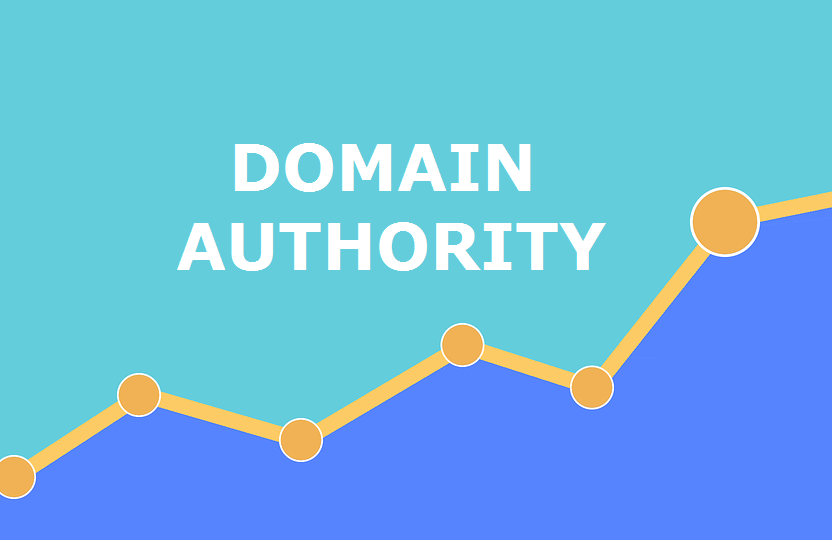You’ve heard the phrase before and are aware of its importance, but you’re not precisely sure what it means or what are the steps to grow your domain authority to rank on google.
A number (metric) representing your website’s authority is called Domain Authority (DA). Your chances of rank on google and appearing higher in search engine result pages (SERPS), and attracting more organic traffic increase with your domain authority.

Moz introduced the Domain Authority metric, but other businesses have produced comparable metrics that evaluate domains based on several criteria and assign them a value from 0 to 100.
PageRank, which was developed by Larry Page (one of Google’s founders), and is still used to this day as a tool to gauge the significance of web pages and websites, gave rise to the concept of ranking domains based on their authority.
What is Domain Authority?
The term “domain authority” refers to a rating that represents the legitimacy of your website and forecasts how well it will do in search engine results. A higher score indicates a more remarkable ability to rank; the score runs from 1 to 100.
Although the algorithms used by the various organizations naturally differ, all of them use data from your site to estimate its potential ranking in search engine results.
In a sense, the score demonstrates the significance of a website inside a given sector.
Therefore, if a website gains a reputation as a thought leader in a particular field, it will inevitably impact how highly search engines rank on google.
A lot of elements are taken into consideration on steps to grow your domain authority and while determining a site’s domain authority.
There are numerous factors to consider, including the total number of inbound links, the number of root domains referring to the website, the control of the linking domains, the number of other distinct fields those sites link to, and many others.
It’s crucial to note that the result is neither final nor authoritative. Simply said, it facilitates estimation and comparison.
The best course of action is to approach it as a comparative metric that illustrates how your website compares to other websites in the same sector.
It’s also noteworthy that Google does not always consider only the score when deciding where to rank your website on its results pages. It’s a nice thing to know that you can grow your domain authority.
13 Practical Steps to Grow your Domain Authority Fast
These are the steps to grow your Domain Authority and rank on google.
1. On-Page SEO
Your page and content need to be optimized as part of on-page SEO.
Our in-depth SEO guide goes into great detail on how to improve your google ranking with SEO, but the most crucial elements are:
- Title and description optimization
- Using headings (H1 and H2) correctly in your content’s URL structure and creating permalinks that are optimized for search engines
- SEO enhances the quality of your photographs, movies, and other media components
- Natural keyword placement in your article (no keyword stuffing)
- Linking within your content (this is a potent SEO technique)
- Formatting your material in a certain way will increase the likelihood that it will appear in Google’s featured snippets.
The importance of content quality as a ranking criterion for both on-page and off-page SEO must be emphasized once more.
Maintaining current and new content is crucial, as Google noted in its SEO recommendations.
Users frequently have a propensity to become sidetracked and ignore your material. If a user has numerous tabs open, a reasonable title tag acts as a placeholder and reminds them of the page’s content.
When you post your page on social media, those services also use and display the title tags.
An important aspect of on-page SEO is KEYWORDS.
The phrase “keywords” is rarely used when discussing on-page SEO.
In reality, many people believe that SEO is just about keywords. Although it isn’t, keywords are crucial if you want to increase your domain authority and make your site more visible to rank on google.
For the content of a page to flow naturally, keywords should be inserted gradually. The era of keyword stuffing is over. Even worse, Google penalizes websites that do it.
As a result, keywords should be subtly incorporated into the content and even the image alt texts.
2. Get Your Off-Page SEO in Order
Off-page SEO refers to endeavours carried out away from your website. Consider it in terms of outside strategies intended to market your website well and attract more visitors.
Influencer outreach is an off-page SEO strategy that is effective. This entails contacting established persons and corporations and politely requesting that they spread your work.
Reaching out to authoritative websites and requesting them to link to excellent content pertinent to them is another component of influencer outreach.
Of course, if your content doesn’t live up to a certain level, they won’t share it. However, if they share your work, it signifies that their followers will pay attention to you.
Your website will be grateful for the exposure it receives.
Joining relevant discussion groups and answering inquiries on “question and answer” websites is another strategy that looks underestimated. These websites are cherished by information-seekers and search engines alike.
You are responsible for responding to inquiries relevant to your area of expertise and participating in conversations.
In essence, you are establishing yourself as a leader in that field. Include links to articles on your website that also relate to the subject.
What will you actually get?
An increase in your website traffic, brand recognition, and domain authority!
3. Take Technical SEO Seriously
To increase your domain authority, you must improve on all facets of SEO.
Technical SEO aims to improve every aspect of a website’s functionality to benefit search engine crawling, indexing, and overall visibility.
As the name suggests, some technical knowledge is necessary.
The good news is that, for the most part, you won’t need to repeat technical SEO once you have it down.
One essential component of technical SEO is security. Your website should be converted to HTTPS by adding SSL (Secure Socket Layer). This indicates that only HTTPS and not HTTP can be used to visit your website.
What is the fuss about HTTPS?
It improves your website’s ranking in search results and builds user confidence. It demonstrates that all data exchanged between your website and the server is encrypted, shielding it from prying eyes.
How relevant this depends on whether you’ve ever made an internet purchase.
Your 404 page can be improved for technical SEO.
Site owners occasionally remove specific pages from their websites. Users frequently make errors when entering URLs into browsers. This brings up the requirement for 404-page optimization.
An optimized 404 page notifies users that the page they are looking for is not accessible as part of technical SEO.
Additionally, it offers a quick way to access the website’s most crucial pages and proposes similar links. The menus for structure and navigation should be identical to those on your website.
Simply enter a website’s URL incorrectly in your browser and perform a search to get an idea of what your 404 page would look like. But be sure to enter the root domain correctly.
4. Speed Up Your Website
A speedier website easily outperforms a slower one in boosting your site’s domain authority.
Although it falls under technical SEO, website speed deserves a separate mention.
40% of users claim they will leave a website page if it takes three seconds or longer to load, according to an infographic by Kissmetrics.
The following measures can be used to gauge a website’s speed:
- The length of time it takes for all of the resources on the page to load completely;
- Time To First Byte (TTFB), which counts the number of milliseconds it takes for a website to begin loading; and
- When a page loads enough resources for the content to be viewed, this is referred to as the “first meaningful paint” (first contextual paint).
Based on all these measures, you should speed up your website. Right, it’s better to err on the side of caution.
You can speed up your website by following these suggestions:
Make your photos smaller. You may have heard this a trillion times, but huge pictures slow down your page.
Trim your code as well. Codes produced by subpar developers are detrimental to your domain authority.
Switch on browser caching. By doing this, a user will save pieces of your website in their browser, which will make it load more quickly the next time they visit.
Make use of a content delivery network (CDN). It determines the precise location of your visitor before serving up your website from a close-by server.
Utilizing tools, like Google Page Insights, Google Mobile Speed Tools, and others will help you achieve this. After analysis, they frequently offer advice and suggestions.
5. Create Quality Backlinks
The king of backlinks in terms of domain authority is a high-quality backlink. The more you have, the better your score will be.
We have a detailed post on link building that we highly recommend reading. But for the time being, consider these things:
Create Great Content: Produce excellent content since reputable websites will only link if it’s truly exceptional. So take your time and produce in-depth blogs, films, and other content that is superior to what is already available online. Without a doubt, the work will be worthwhile.
In order to generate backlinks, both the topic and the content’s length are crucial factors.

Source: backlinko.com
Promote your work: Just having excellent content isn’t enough. Promote it to your email list and social media followers to give it a boost. By doing this, you will increase the chances that someone will notice your work and provide a backlink to it.
Put a link-building plan into action: High-quality content and a reliable promotion plan will set things off. But you should also approach link building with more initiative. Contact reputable websites and request links from them to accomplish this. Just be aware that there are appropriate and wrong ways to do it, which we describe in the article on link building mentioned above.
Commit to guest blogging: Lastly, committing to guest writing might be a terrific strategy to increase the number of backlinks to your website. One possibility is that you might include a link to your own website in the writing you do. And second, people who read your guest post might find it interesting, visit your website to look for related material, and then link to some of your postings.
6. Cut Back on Low-Quality Backlinks
Links are not all made equal. You must get high-quality links and get rid of low-quality ones to raise your domain authority score. But this raises the issue of what constitutes a high-quality link.
A good website is the source of a quality connection.
A link from the New York Times, for instance, would be regarded as high-quality because the publisher is well-known and esteemed.
On the other hand, links from unrecognized, spam-filled websites would be considered low quality.
Using a tool like SEMrush to find backlinks that lower your domain authority score is the simplest way to eliminate low-quality connections.
Once you get the entire list, try manually deleting each entry or using Google to stop them.
7. High-Quality Content Increases Domain Authority
Your domain authority will increase if you produce excellent content.
High-quality content is written with your audience in mind and provides in-depth responses to their queries.
Here are some pointers for producing great content:
Give detailed information; brief posts of 500 words might not be helpful. Additionally, utilize informal wording. Let the article be beneficial and offer a solution to a specific problem. It is simple to lose focus when creating long-form content. Maintain your attention.
Users desire entertainment and thrills in addition to knowledge and information. Consider your article as a dialogue with the reader; add some pop-culture references and emotional overtones.
Make it readable by everyone. The truth is that many people scan posts. Large text walls can be scary as well. Therefore, use brief paragraphs, big letters, numbered lists, and bullet points to stop readers from leaving your site.
Utilize keywords wisely. Use synonyms and different word forms to help readers find the keyword throughout your text. A blog on your website is a no-brainer if you are serious about increasing your domain authority.
SerpIQ did a study including over 20,000 keywords back in 2012. The findings revealed that each of the top 10 results had an average content length of more than 2,000 words.
The content at the top of the list had an average word count of 2,416. The typical word count for the tenth position was 2,032.
That proof is pretty conclusive. Long-form content is something to think about using if you want your articles to rank well.

It functions as a space for content creation. It is impossible to overstate the advantages of having a blog on your website.
It doesn’t matter what name you call it. Different captions, including “What’s New” or “Tips,” can be found on web pages. It is sufficient to have a section of your website devoted to offering material to your audience.
8. User Experience Is a Concern
Keep your site’s visitors in mind. Make them the focus of your website.
The technological aspects of your website down to how you create your content all play a part in user experience. Everything is designed to make users enjoy their time on your website.
Make sure your website is mobile-responsive as one efficient method. Most people today access the internet on their mobile devices. Since your website’s layout is terrible, nobody wants to constantly have to zoom in and out to access the content.
Conducting keyword research and adapting content with a solid grasp of searcher intent is another aspect of user experience.
It allows you to write appropriately by revealing the numerous terms that searchers use to look up information.
In addition to providing knowledge, your postings should also amuse your audience. Their visit to your website ought to be a memorable one.
9. Use Effective Site Navigation
A properly constructed website always wins over a poorly organized website.
The internal linking structure is another name for the site navigation. It speaks of the ties that bind the web pages on your site together.
They facilitate site navigation and let search engines know which pages are present. Every time you enter a supermarket, you’ll notice that it is structured and segmented. The same principles govern an effective internal connection structure.
There are several ways to make your website simple to navigate. First off, offer a link to a product to allow purchases if you want to turn users into customers.
Mega menus are also useful if your website has a lot of content. They effectively separate pages that are relevant to the same keyword and group subpages and keywords.
Utilizing picture carousels is another piece of advice. Since they take up relatively little room, they are useful if your website contains a lot of content.
Furthermore, the images they contain effortlessly captivate the mind and, in some circumstances, the emotions.
10. Publishing Consistently
Another suggestion for increasing your domain authority is to publish new material frequently. The regular publication shows that your website is serious about business.
Additionally, if your website is new, it facilitates Google’s crawling process more quickly.
A good suggestion for consistent content creation is writing at least one post weekly. Although it might not seem like much, keep moving forward and see how far you can get in another two months.
Right, go steadily, and slowly.
11. Maintain a Tight Grip on Your Social Media Marketing
Don’t think of social media as a venue for posting solely amusing videos. Keep in mind that everything is connected to the Internet.
Social signals significantly increase your site’s domain authority. Share the link to your newly published post on Facebook, Twitter, Pinterest, and LinkedIn. By all means, carry on your campaign there if you are active on other platforms.
Search engines highly value these platforms, so if your link appears prominently on one of them, we can assure you that you are in for a treat.
There is a distinct difference between pages that rank highly on Google and social signals, even though Google has repeatedly declared that social signals are not part of the Google ranking algorithm. Google-popular pages typically receive a lot of likes, shares, and tweets.
It would be best if you did the following actions to raise your domain authority:
- To improve your Facebook company profile and strive to gain more fans.
- For the content you post to get attention, you need to maintain an active social.
- Media presence on social networks (likes, tweets, etc.).
- Ensure that your sites feature a social media button so readers can easily share your material.
- Make sure your material displays correctly when shared via social sharing buttons.
12. Mobile Friendly Website
A mobile-friendly website is now required, not just great to have or optional.
Here are some of the causes:
- Mobile searches increasingly outnumber desktop searches (about 60%).
- The majority of people begin their searches on mobile before moving to desktop.
- Having a mobile-friendly website is a ranking factor (for showing up in Google search results).
- Websites that are not mobile-friendly will not be included in Google’s mobile-first index, which is currently in development.
- Your total Domain Authority Score will suffer if your website does not have a mobile-friendly or responsive version.
The most accessible place to start if your website isn’t mobile-friendly is to visit Google’s Mobile-Friendly Test and run the test for your domain.
Google will provide you with a lovely report that includes suggestions for optimizing your website for mobile devices.
13. Show Patience
Increasing your domain authority is a process that takes time, as was indicated in the post’s opening.
You need to be patient because it will take some time for crawlers to read and assess your website after you make any of the modifications listed above.
Your domain authority score will benefit from your consistent efforts to raise your Google rankings.
Key Takeaways
- To increase your domain authority, you must improve on all facets of On-page, Off-page and technical SEO.
- Make sure your website is responsive to mobile devices.
- Keep in mind that everything is connected to the Internet so social media is a must.
- Publish regularly, regular posting demonstrates the seriousness of your website’s business.
- A backlink of exceptional quality is the king of domain authority.
Conclusion
In conclusion, try not to stress your domain authority score. It’s a figure that compares your domain’s strengths to those of other parts in the Moz database.
A low DA score does not guarantee poor Google performance for your website. A high DA score indicates that you are on the right track, but it is only a prediction and does not ensure that you will receive better ranks or more visitors.
Always strive to keep the larger picture in mind while developing a website so that it can, over time, obtain dependable ranks in Google and other search engines.







Thank you for sharing the awesome article with us. that’s very useful. Provides much-needed knowledge.